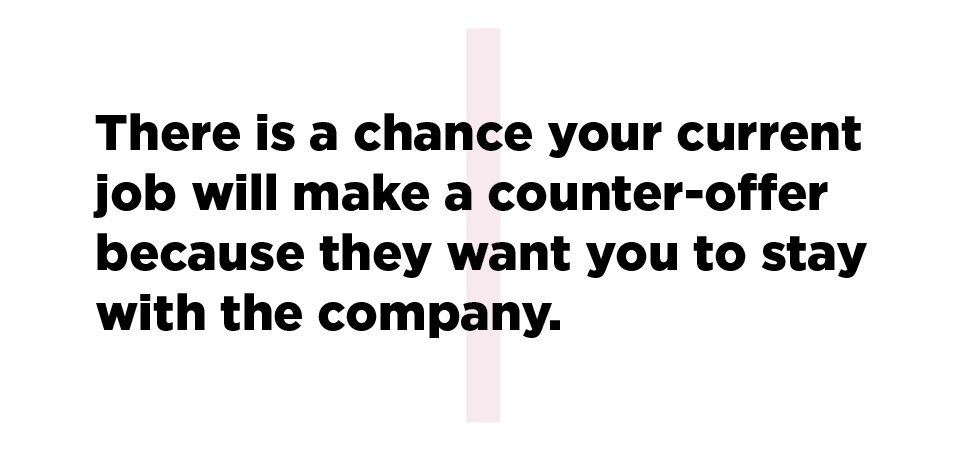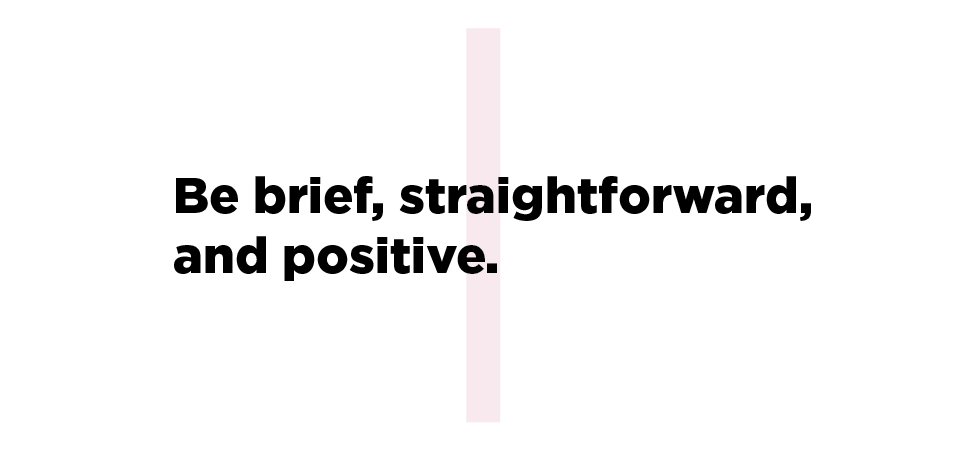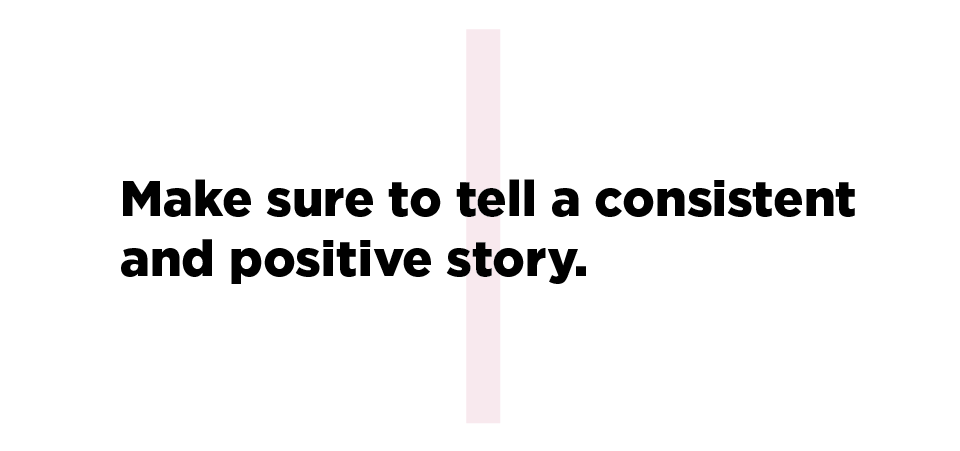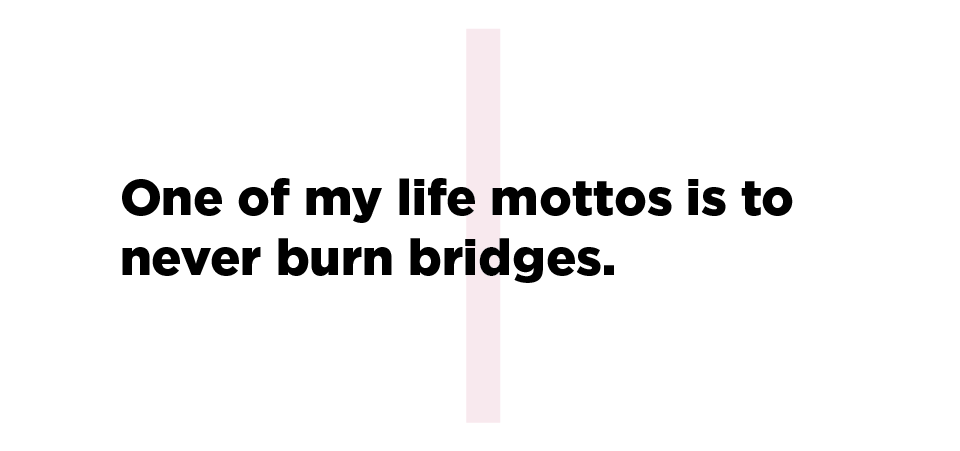The problem isn't always finding a job—it's quitting a job with integrity. Here's how to do just that.
Luckily, I turned to my parents and Google. I prepared accordingly, told my manager, handed in my resignation letter, did all of the other necessary steps, and left knowing I’d have a good reference from my previous employer if I needed one in the future. I even got an ice cream cake at my going away party!
I was able to quit my job gracefully and keep the professional and personal relationships I built at the organization. Want to know how I did it?
Here are a few things you need to know about quitting your job—with your reputation and a reference in hand.
Table of Contents
Things to Do Before You Quit
Before you submit your resignation to your boss, be sure that this is what you want. Are you prepared to leave your current role? Have you considered the signs that
quitting your job might not be the answer?
Have you thought through your short-term and long-term goals to make sure a new job is the best move for you? It's easy for people to get distracted by a new job title, better benefits, a higher salary, and the "grass is greener" mentality, but there might also be a lot of positives to
your "good enough" job.
While you're considering things, keep it to yourself. I know you're dying to tell your
work wife, but hold off. You don't want to give any indication that you're moving on just yet. There will be plenty of time to clear out your desk after you've quit the right way.
One thing you will want to do if you've decided you're going to quit and gearing up to tell your boss is to start saving any files you want to Google Drive or elsewhere online. You can also email copies to yourself. You may not have access to your computer once you turn in your resignation, so have copies of everything you need before you tell your boss that you're quitting.
How to Resign From Your Job: 10 Steps to Follow
1. Get the Offer in Writing...But Don’t Accept Just Yet
Once you have an official job offer in hand, take some time before you accept. Say
thank you for the job offer, but tell them you’d like a day or two to let them know your final decision.
There is a chance your current job will make a counteroffer because they want you to stay with the company. Of course, you’ll have to consider why you were looking in the first place and the pros and cons of both jobs, but it’s easier to do that when you haven’t already contractually committed to another offer.
If you know you won't be able to stay in your current role, go ahead and sign your new offer letter. Once that is official and you're not worried about any counteroffers from your current employer, move on to the next step.
2. Tell Your Manager First
Your manager should be the first person to know that you are resigning from your position. You can tell Human Resources and your work friends afterward. The news should come from you. Keep in mind with all of these options that you do not need to share details about your new job if you don't want to.
Your manager doesn't have to know the next company or job you're going to; however, it's pretty normal to share what your next steps will be if you know them. Being secretive can create a negative feeling, and that's not what we're trying to create here!
Here are a few ways you can do it, depending on your location and relationship.
Pro Tip: Resigning in person is always best if you have that as an option.
How to Resign in Person
Email your manager to set up a time to speak. You don’t have to tell them that you are setting up a meeting so you can resign. (That’s the work equivalent of a breakup text or breakup email.)
You can be vague and say that you’d like to speak with them and ask to put time on your manager’s calendar.
Start the meeting by
telling your manager that you’ve received a job offer. If you are interested in staying at your current position, wait to see how they react because they may immediately discuss a counteroffer. If you know that you definitely want to leave, or if they don’t bring up a counteroffer, let them know that you are meeting to announce your resignation.
Remember to stay positive—even if you didn’t enjoy your job and are excited to be
handing in your notice. Tell your manager that you had a great experience, learned a lot, and that this move is what is best for your career trajectory. Staying positive is one of the keys to leaving on a good note.
How to Quit Over the Phone or in a Virtual Meeting
If you're a fully remote employee or it will be a long time till you see your boss in person, then you have options: phone and online or virtual meetings. Because of Covid-19, most workplaces are comfortable with online meetings, so it's a good alternative if you need it.
You will schedule this in a similar way as in-person meetings. Request to connect 1:1 and put time on your manager's calendar along with the phone number you will call or a link to the online video service you're using.
Start the conversation by letting them know
you've received another job offer. If you are open to a counteroffer, you can let them know you haven't accepted the job yet and would be open to discussing your future at your current employer. Your manager might discuss the next steps about a counter-offer, or they might tell you that it's against company policy.
Once you've established that you are indeed quitting, you will want to fully communicate that you have another job offer that you are going to accept, and you will submit your formal resignation next.
How to Resign Over Email
This happened to me once. Our company was on holiday break, and the person sent me an email informing me of their resignation because they needed to give their two weeks' notice while it overlapped with the holiday.
Her email was brief. It informed me of her resignation, her last day, and her future plans. She also mentioned connecting in person when we were back in the office after our holiday break.
Resigning over email should only be used in really unique situations like this.
3. Give Two Weeks' Notice (At Least!)
Two Weeks Notice isn’t just a great romantic comedy starring Sandra Bullock and Hugh Grant. Most jobs expect you to give at least that amount of time
when you quit your job.
Giving two weeks' notice is a promise that you'll work for two weeks after formally resigning. Your supervisor may ask for you to give a longer notice period, meaning more than two weeks, or you may want to offer to stay longer to wrap up projects.
Most employees are "at-will" workers. This means that you legally don't need to even give two weeks; however, that amount has become a courtesy. If you're trying to leave on good terms with your current employer and you know that finding your replacement will take time, you might want to consider giving more time.
Before you make any promises, find out if your future employer is
flexible with your start date. You’re more likely to be in good standing with your current company if you make the transition as seamless as possible—even if it means staying a week or two longer. This is especially important if you have a senior position or if you’re working on client work that will be finished within a reasonable amount of time.
4. Write a Resignation Letter
There are also many different types of resignation letters. Some will share your new role. Some won't give much notice. Some will allow your company to contact you after you leave with any questions via your personal email.
We're written an entire article on the dos and don'ts surrounding your letter of resignation that you can review
here.
Resignation Letter Example
Dear [Boss Name],
Please accept this my official resignation letter from my role as [Project Manager]. My last day will be [Friday, March 1, 2022].
I'm so grateful to have worked with a creative team these last five years and have learned so much. By far, one of my greatest takeaways is learning about how project management fits into a company's overall strategy and getting to launch a new software program for the company.
I'm grateful for your guidance and mentorship along the way and know it will serve me well in my role.
I will make sure all of my deadlines are completed before my departure, and I plan on working with my team to assign new people to my current clients and projects. Please let me know if there is anything else you'd like me to do.
You can always reach me at [xxxxx@gmail.com] if future questions pop up!
Sincerely,
[Your Name]
5. Help with the Transition
Do as much as possible to help
create a smooth transition as you exit your role at the company. At one job, I made a detailed guidebook answering any possible questions the new hire might have in the transition plan.
I also stayed to help her transition into the role. My manager was impressed, and I felt more comfortable with my departure. Plus, it's a great way to almost guarantee a future reference if you need one!
Write down details like important deadlines, notes about clients, and other pertinent information. Additionally, organize all papers and electronic files so that they can be found easily (and no one calls your cell phone with questions).
6. Finish as Much Work as Possible
Finish as many projects as you can before you leave. You understand the work best, so there is a higher likelihood that the work will get done correctly and efficiently if you’re the one doing it.
If you can’t finish in time, or if it’s an ongoing project—add details, action items, and descriptions to your transition document.
7. Tell Your Colleagues
Let your coworkers know that you’re leaving. Make sure to tell a consistent and positive story—even if you’re leaving because your boss makes Miranda Priestly look like a piece of cake. Don’t start the rumor mill because your reputation may suffer as a result.
Let them know what you’re doing next, connect on LinkedIn, and ask people you worked with closely for a LinkedIn recommendation while working with you is still fresh in their minds!
After you've had the dreaded "I'm leaving" conversation in person, you can follow up with an email to individual coworkers or a group email to your team.
Here are a few ideas:
Goodbye Email to One Coworker Example
Hi [Name],
I know I already shared the news of me leaving my position as [Job Title] here at [Company] on [Last Day], but I wanted to send a quick note to let you know how much I’ve enjoyed my time here—and you’ve played a part in that.
It’s been so great working with you and getting to know you. The people here at [Company] have honestly been one of the best parts of working here.
While I won’t be in the office anymore, I definitely hope you’ll keep in touch. My personal email address is [xxxxx@gmail.com], so don’t hesitate to reach out whenever.
Wishing you all the best!
[Your Name]
Goodbye Email to a Team of Coworkers Example
Hi team,
Friday is my last day as [Job Title] here at [Company], and I want to thank you all for making the last few years so great!
Although I won't be an official part of the team anymore, I'll always be a fan and watch out for your great work! I'd love to stay in touch with anyone interested. My LinkedIn profile is here [insert link) and my personal email address is [xxxxx@gmail.com], so don’t hesitate to reach out whenever.
Thanks again for being a part of making my time here at [Company] so great!
Best,
[Your Name]
8. Write Thank You Notes
Write thank-you notes to your manager, mentors, people you managed, and people you worked with closely. In your letters, mention what you learned from them, your appreciation for their work, how much you enjoyed working with them, and let them know how they can stay in touch in the future. Here's what I wrote to my boss to thank her for her leadership:
Thank You Note to Manager Example
Hi [Manager's Name],
It's bittersweet that today is my final day here at [Company]! I’ve enjoyed my time here and getting to work with you so much.
I’ve learned from your experience, taken your great advice, and appreciated your guidance over the past [length of time], and my time spent as a [job title] on this team has been such a valuable part of my career journey.
I know I’ll carry the things I’ve learned here with me to my next adventure, and I’ll always look back on this experience with a lot of fondness.
I’d love to keep in touch and can be reached anytime via my personal email address: [xxxxx@gmail.com].
Thanks so much, once again, for your leadership. Know that I’m always wishing the best to you and the [department] team!
All the best,
[Your Name]
9. Be Diplomatic in Your Exit Interview
Many Human Resource departments will ask you to
complete an exit interview. The purpose of the exit interview is to solicit your feedback about your role and time at the company and to make note of your reason for leaving.
Don’t use this as a time to vent because the details will be recorded. Simply answer diplomatically, positively, and explain that you’re leaving because you’ve found a new opportunity that will be good for your career path and accomplishing your professional goals.
Mention that you enjoyed your time at the company, learned a lot, and are excited about the next step.
10. Stay Positive When You Leave
It is a very small world, and you don’t know how people are connected or what could get back to your potential employer. Stay positive about the work environment in person and on social media when you leave. Oh, and don’t raid the supply closet for notepads and ballpoint pens when you leave!
One of my life mottos is to never burn bridges. Who knows—you might want to work for the company or your former colleagues again. You’re also likely to need references as your career progresses.
What to Do After You Quit Your Job
After you quit your job, remember to stay in touch. Connect with people on LinkedIn, and celebrate their accomplishments when you see or hear about them with an email or LinkedIn message. And don't forget to keep
networking with them! Peer networking is incredibly valuable, and you never know when it will lead to a new opportunity.
Follow these tips when you do quit to help you leave your job gracefully while maintaining the important relationships that will help you continue to grow your career.















